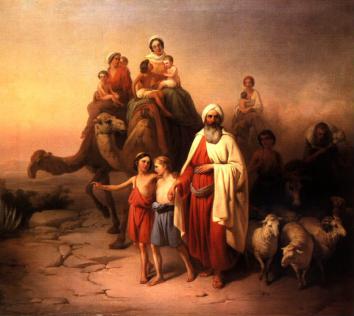Every week, parshaoftheweek.com brings you a rich selection of material on parshat hashavua, the weekly portion traditionally read in synagogues all over the world. Using both classic and contemporary material, we take a look at these portions in a fresh way, relating them to both ancient Jewish concerns as well as cutting-edge modern issues and topics. We also bring you material on the Jewish holidays, as well as insights into life cycle rituals and events...
Well, the massacre in Aleppo is reaching its final bloody stages, and we all sit around doing basically nothing. The butchery of the past five years in Syria, performed by Assad and his Russian, Lebanese, and Iranian accomplices, has apparently claimed close to half a million lives, and the number is rising. I certainly recognize that there really is little the average person can actually do, but whatever that little is, it is certainly more than what has been done. Although I am proud of the medical assistance that Israel continues to give to some of the victims, as Jews, as human beings, we should all be ashamed.
In this week’s parsha, Va’Yishlach, Yaakov successfully navigates his return to the Land of Canaan and his reunion with his brother and rival, Esav. Then, after he has managed to extricate himself from dangerous interactions with both his uncle Lavan and his brother Esav, we are told that “Yaakov came safely to the city of Shechem…and he camped before the city.”
Because of the similarity that the Hebrew word for “and he camped” (ויחן) has with the word for niceness, grace, or kindness - חן - the Rabbis of the Talmud read this to mean that once Yaakov arrived at Shechem he did something nice, something good for the citizens. This is understood as a response, a thank you, for the kindness God had shown him in helping through the dangers he faced with Lavan and Esav.
What kindness did he show them? “Rav says, he arranged coinage for them. Shmuel says he arranged a market place for them. Rabbi Yochanan says he arranged bathhouses for them.” (Babylonian Talmud, Tractate Shabbat, 33a). In other words, to thank God for saving him from the threats posed by Lavan and Esav, and helping him come through those experiences successfully, he made some civic improvements to the place in which he had just settled.
This is told to us in the course of the long and famous story of how Shimon Bar Yochai, along with his son, was miraculously helped by God to hide for many years from the Romans, whom he had vilified. In that story, Shimon Bar Yochai, like Yaakov, shows his gratitude by doing his civic duty – he uses his halachic acumen to permit the local Cohanim (priests) to use a path that was suspected of containing buried bodies, which would make the area ritually unclean and forbidden to them. This precisely parallels the civic improvements – the bathhouse, the market, the coinage – that Yaakov made for the people of Shechem.
It is noteworthy that the way both Yaakov and Shimon Bar Yochai show their thanks for God’s intervention in their affairs is by performing perhaps helpful, but certainly mundane, acts. They seem to be saying: “well, God helped me, so I will help others”, but the assistance is pretty pedestrian. It is also noteworthy that Yaakov did this for the people of Shechem, people who, in the very next story, will be guilty of allowing one of their leaders, Hamor, to rape and kidnap Yaakov’s daughter, Shechem. They will, in fact, be killed by Yaakov’s sons for this crime.
I am reminded of something I heard many years ago in the name of Rav Yisroel Salanter, the founder of the modern Mussar movement: “Another person’s mundane, physical challenges are my spiritual ones.” If someone is facing physical difficulties, it is an act of spirituality for us to recognize that and come to their assistance. Yaakov, and, centuries later, Shimon Bar Yochai, were moved by God’s mercy to be sensitive to a physical, quotidian, need felt by their neighbors, and help them with it. It would seem that this is how we show that we appreciate God and want to be like Him – by having mercy on and assisting those who need help. This, not singing, dancing, or meditating, is the way we are spiritual, God-like, and imitative of His holy qualities: we help people. Even people who are problematic, as the people of Shechem would prove to be. Even when it comes to seemingly small, insignificant things, like markets, or access to roads, and certainly to more dramatic needs.
It is probably too late for much to be done for the people of Syria, and I do recognize how complicated the situation is. But their physical needs are great – life or death – and Yaakov teaches us here that we do not pick and choose to whom we show divine kindness and concern. We, to whom God has given so much, should be ashamed of ourselves.
Shabbat Shalom,
Shimon



Get inspired by Vayishlach Divrei Torah from previous years